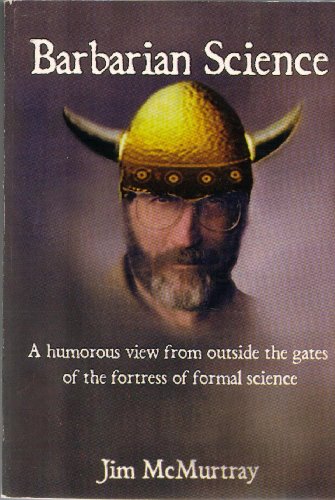- Date: 26.10.2009
- Book: Barbarian science
- Author: plappen
Review
Barbarian Science, Jim McMurtray, Town Square Books, 1999For many years, the scientific community has considered itself to be some kind of secret society, protecting its knowledge against the barbarians at the gate, clamoring to get in. This book is intended for those smart barbarians.
The first requirement for admission to the scientific "priesthood" is the possession of an advanced college degree. But, that by itself does not equal intelligence. There are plenty of people out there who may not have the appropriate credentials, but are smarter than those who do.
There are some sciences which are easier for outsiders to undertake than others. It is much easier to become an amateur astronomer, for instance, than an amateur nuclear physicist. Newspaper and TV reporters may honestly care about reporting science the right way, but time and space constraints may require them to dumb down the science too far, and lose the essence of the story.
A central topic in this book is science literacy, which is not helped by schools turning science into rote memorization of formulas and Absolute Truths (which will probably change within a generation). Scientists have a very hard time getting rid of Scientific Model X, even in the face of new data which shows that Scientific Model Y does a much better job of explaining things. They would rather put patch after patch on Model X, until its nothing but patches.
A favorite game for scientists is to pick out scientific inaccuracies on TV and in the movies. The author has no problem suspending his disbelief when it comes to hand-held lasers or faster-than-light travel. Its different when a spaceship, for instance, travels to Ursa Major. It is not a specific place. Ursa Major is a group of stars spread out over many, many light years that happen to form a picture when seen from Earth. Travel to some other star, and the stars that make up Ursa Major will form a totally different picture. A person can no more stand on a specific planet and say "This is Ursa Major" than they can stand on a specific spot and say "This is the Atlantic Ocean."
This book is easy to read, so it is recommended for those who think of themselves as science-free. For those in the science world, perhaps this book will encourage some of you to ease up on the "entrance requirements" for the rest of us.
Recent actions
-
toryah1988 has added Harry Potter And The Order Of The Phoenix to their read list.
-
toryah1988 has added Harry Potter And The Goblet Of Fire to their read list.
-
toryah1988 has added Atonement to their read list.
-
toryah1988 has added New Moon (The Twilight Saga) to their read list.
-
Monica has added The Da Vinci Code (Large Print) to their wish list.
